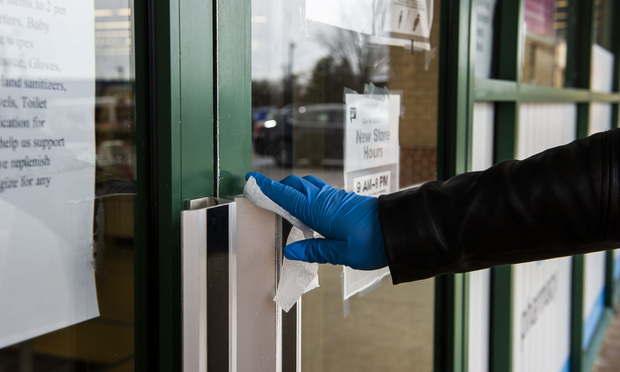Legal Industry Shed 64,000 Jobs in April as Layoffs and Furloughs Spread
Cost-cutting measures at law firms and other major legal employers have continued to accelerate since they began in March.
May 08, 2020 at 11:11 AM
4 minute read
 A woman wipes the door handles before entering a Walgreens store in Baltimore on March 24, a day after Gov. Larry Hogan ordered the closure of all nonessential businesses in the state. (Photo: Diego M. Radzinschi/ALM)
A woman wipes the door handles before entering a Walgreens store in Baltimore on March 24, a day after Gov. Larry Hogan ordered the closure of all nonessential businesses in the state. (Photo: Diego M. Radzinschi/ALM)
To the surprise of no one, the April jobs report from the U.S. Bureau of Labor Statistics showed massive employment losses, totaling over 20 million positions for the month, and legal jobs were no exception.
The legal sector showed a net loss of 64,000 jobs—a decline dozens of times larger than the fluctuations normally seen by the industry. The overall unemployment rate across industries stands at 14.7%, according to BLS data, higher than any time since the Great Depression.
The report on Friday showed 1,097,006 people working in the legal industry, including attorneys, paralegals, legal secretaries and others. The figure is down by 50,000 jobs from this point last year.
Updated numbers for the prior month saw the overall job market lose over 700,000 jobs in March, with the legal industry showing a loss of 1,700 jobs.
But that was before COVID-19 had a full month of stay-at-home restrictions to bolster its devastating economic effects.
Pandemic-related cost-cutting measures at major legal employers—big law firms most prominently—have been accelerating since they began in March, with April and early May bringing increasing reports of furloughs and layoffs.
Some large firms, such as Mayer Brown and Hogan Lovells, have managed to get by thus far with pay cuts and dividend deferrals. But others, such as Nixon Peabody, Goodwin Procter and Sheppard, Mullin, Richter & Hampton, have all made substantial staff cuts to go along with pay reductions for attorneys and staff.
The last time the legal industry went through an acute economic crisis, during the Great Recession, layoffs were the norm. For now, many large firms are still opting, when they can, to enact pay cuts, hour reductions and furloughs instead.
Unlike during the Great Recession, though, the direct impacts of the pandemic are spread across every industry, the flurry of austerity measures has happened quickly, and there isn't a clear path forward to recovery.
Mixed messages at the federal level, differing local situations in states and municipalities and the possibility of months or more of uncertainty over economic conditions put businesses, including law firms, in the unenviable position of trying to plan for something they can't see.
Many of the geographic areas in the U.S. that were hit hardest initially by COVID-19, such as New York, Detroit and Seattle, have seen success in slowing new cases, but they are rising elsewhere. That could drive major regional variations in when demand will ramp back up and whether a return to the office is possible. With regard to the latter, it doesn't seem firms are in that much of a hurry.
Other findings in Friday's jobs report include:
- Unemployment overall rose by 10.3 percentage points in April, the largest monthly increase since records started being kept in January of 1948.
- Workers who identify as white had an unemployment rate of 14.2%; those who identify as Asian were at 14.5%; those who identify as black were at 16.7%; and those who identify as Hispanic were at 18.9%. With the exception of those who identify as black, the numbers are all record highs.
- Those who were on a temporary layoff increased by a factor of 10 to more than 18 million.
- Labor force participation rate fell 2.5% to 60.2%, the lowest recorded level since 1973, when the rate was at 60%.
- Leisure and hospitality lost 7.7 million jobs, or 47% of the workforce.
Read More:
As US Unemployment Soars, Legal Industry Hopes to Avoid Widespread Layoffs
Legal Sector Enjoys Employment Rebound in Latest Jobs Report
This content has been archived. It is available through our partners, LexisNexis® and Bloomberg Law.
To view this content, please continue to their sites.
Not a Lexis Subscriber?
Subscribe Now
Not a Bloomberg Law Subscriber?
Subscribe Now
NOT FOR REPRINT
© 2025 ALM Global, LLC, All Rights Reserved. Request academic re-use from www.copyright.com. All other uses, submit a request to [email protected]. For more information visit Asset & Logo Licensing.
You Might Like
View All
Saul Ewing Loses Two Partners to Fox Rothschild, Marking Four Fla. Partner Exits in Last 13 Months
3 minute read
Dentons Taps D.C. Capital Markets Attorney for New US Managing Partner

Exceptional Growth Becoming the Rule? Demand Drove Strong Year for Big Law

Eagles or Chiefs? At These Law Firms, Super Bowl Sunday Gets Complicated
3 minute readLaw Firms Mentioned
Trending Stories
Who Got The Work
J. Brugh Lower of Gibbons has entered an appearance for industrial equipment supplier Devco Corporation in a pending trademark infringement lawsuit. The suit, accusing the defendant of selling knock-off Graco products, was filed Dec. 18 in New Jersey District Court by Rivkin Radler on behalf of Graco Inc. and Graco Minnesota. The case, assigned to U.S. District Judge Zahid N. Quraishi, is 3:24-cv-11294, Graco Inc. et al v. Devco Corporation.
Who Got The Work
Rebecca Maller-Stein and Kent A. Yalowitz of Arnold & Porter Kaye Scholer have entered their appearances for Hanaco Venture Capital and its executives, Lior Prosor and David Frankel, in a pending securities lawsuit. The action, filed on Dec. 24 in New York Southern District Court by Zell, Aron & Co. on behalf of Goldeneye Advisors, accuses the defendants of negligently and fraudulently managing the plaintiff's $1 million investment. The case, assigned to U.S. District Judge Vernon S. Broderick, is 1:24-cv-09918, Goldeneye Advisors, LLC v. Hanaco Venture Capital, Ltd. et al.
Who Got The Work
Attorneys from A&O Shearman has stepped in as defense counsel for Toronto-Dominion Bank and other defendants in a pending securities class action. The suit, filed Dec. 11 in New York Southern District Court by Bleichmar Fonti & Auld, accuses the defendants of concealing the bank's 'pervasive' deficiencies in regards to its compliance with the Bank Secrecy Act and the quality of its anti-money laundering controls. The case, assigned to U.S. District Judge Arun Subramanian, is 1:24-cv-09445, Gonzalez v. The Toronto-Dominion Bank et al.
Who Got The Work
Crown Castle International, a Pennsylvania company providing shared communications infrastructure, has turned to Luke D. Wolf of Gordon Rees Scully Mansukhani to fend off a pending breach-of-contract lawsuit. The court action, filed Nov. 25 in Michigan Eastern District Court by Hooper Hathaway PC on behalf of The Town Residences LLC, accuses Crown Castle of failing to transfer approximately $30,000 in utility payments from T-Mobile in breach of a roof-top lease and assignment agreement. The case, assigned to U.S. District Judge Susan K. Declercq, is 2:24-cv-13131, The Town Residences LLC v. T-Mobile US, Inc. et al.
Who Got The Work
Wilfred P. Coronato and Daniel M. Schwartz of McCarter & English have stepped in as defense counsel to Electrolux Home Products Inc. in a pending product liability lawsuit. The court action, filed Nov. 26 in New York Eastern District Court by Poulos Lopiccolo PC and Nagel Rice LLP on behalf of David Stern, alleges that the defendant's refrigerators’ drawers and shelving repeatedly break and fall apart within months after purchase. The case, assigned to U.S. District Judge Joan M. Azrack, is 2:24-cv-08204, Stern v. Electrolux Home Products, Inc.
Featured Firms
Law Offices of Gary Martin Hays & Associates, P.C.
(470) 294-1674
Law Offices of Mark E. Salomone
(857) 444-6468
Smith & Hassler
(713) 739-1250










